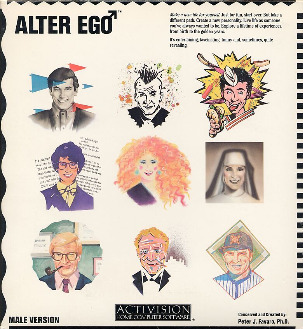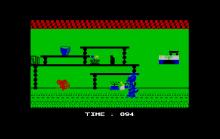Alter Ego
How to play Alter Ego
Alter Ego was a text-based life simulation game, so gameplay relied entirely on reading text descriptions and selecting responses using the keyboard. No mouse or joystick was required.
Alter Ego Description
Alter Ego was a pioneering computer game released in 1986 that allowed players to live out an entire lifetime through text-based scenarios. Developed by Peter Favaro, Alter Ego broke new ground in the emerging genre of life simulation games.
At the start of the game, players would enter details about their character like name, gender, and personality traits. The game would then progress through seven life stages, from infancy all the way to old age and death. At each stage, players would be presented with different situational text scenarios and given a choice of responses. Their choices would have consequences that shaped the course of their character's virtual life.
Topics covered included family relationships, romantic relationships, jobs, moral dilemmas, midlife crises, and end-of-life care. Alter Ego simulated many of the typical life events in a naturalistic way, though often with a dose of humor or exaggeration. The game was notable for allowing players to live out experiences from a first or second person perspective, which created an immersive roleplaying experience.
While primitive by today's graphical standards, Alter Ego was groundbreaking in blending psychology, education and entertainment into one of the earliest and most fully-realized life simulators. It paved the way for more advanced games that aimed to capture the nuances and complexities of the human experience.
Cheats/Hints/Walkthroughs for Alter Ego

Introduction to Alter Ego
Alter Ego is not just a game; it's an exploration into the intricacies of life itself. Developed in the 1980s by psychologist Peter J. Favaro, Ph.D., Alter Ego presents a unique blend of life simulation and role-playing elements that captivate players by allowing them to experience an entire lifespan, from birth to death. This text-based game stands out for its psychological depth and the way it mirrors the complexity of human existence, making it a timeless classic in the realm of interactive fiction.
Gameplay Mechanics: Navigating Life's Choices
At the heart of Alter Ego's gameplay is the decision-making process that simulates real-life choices and their consequences. Players navigate through various scenarios that span across different stages of life, including childhood, adolescence, and adulthood, making decisions that affect their character's development, career, relationships, and overall life trajectory. The game's interface, primarily text-based, presents these scenarios in a compelling narrative form, engaging players in a deeply personal journey.
Cultural Impact and Legacy
Alter Ego's impact extends beyond its innovative gameplay; it has left an indelible mark on the gaming community and culture at large. By offering a reflection on personal growth and the human condition, it has influenced not only gamers but also educators and psychologists interested in the potential of interactive media to explore complex life themes. Its legacy is evident in the way it has inspired a genre of life simulation games, pushing the boundaries of what video games can achieve in terms of storytelling and emotional engagement.
Key Features That Make Alter Ego Stand Out
- Life Simulation: A comprehensive simulation of life's stages, offering a unique perspective on the human experience.
- Decision Making: Choices that genuinely affect the game's outcome, reflecting the unpredictability of life itself.
- Psychological Depth: Insight into psychological development and the factors that shape our identities.
- Educational Value: Offers insights into human behavior, making it a valuable tool for learning and reflection.
Exploring the Game's Interface and Design
The design of Alter Ego is simple yet effective, utilizing a text-based interface that allows the narrative to shine. This minimalist approach focuses the player's attention on the story and the weight of their choices, proving that impactful gaming experiences don't necessarily require flashy graphics or complex mechanics. The game's design underscores the power of narrative in creating immersive and thought-provoking experiences.
Similar Games for Enthusiasts
Fans of Alter Ego looking for similar experiences might enjoy the following games, which also offer deep narrative-driven gameplay and the exploration of life's many facets:
- Life is Strange: A graphic adventure game that explores themes of friendship, time travel, and the butterfly effect in decision-making.
- The Sims Series: Offers a more graphical take on life simulation, allowing players to create and control virtual people and guide them through life's challenges.
- BitLife: A text-based life simulator that mirrors the decision-making aspect of Alter Ego, presenting players with choices that shape their character's life from birth to death.
Conclusion: Why Alter Ego Remains Relevant
Alter Ego's enduring appeal lies in its ability to engage players in a narrative that mirrors their own lives and choices. It stands as a testament to the power of video games as a medium for exploring the depth of human experience, making it a must-play for those interested in the psychological and narrative possibilities of gaming. As we continue to see advancements in technology and storytelling within the gaming industry, Alter Ego remains a pioneering classic that offers a timeless exploration of life's complexities.
In a world where video games are often seen merely as entertainment, Alter Ego challenges players to reflect on their values, decisions, and the paths they choose in life, making it a profound journey that resonates long after the game is over. Whether you're a seasoned gamer or new to the world of interactive fiction, Alter Ego offers a unique and enriching experience that is not to be missed.

















Write a comment